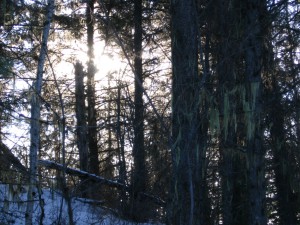Monday
Community Articles, Dharma TeachingsOrdinary Bravery
 Shastri Column: This new article is part of a series of articles by Shastris – senior Shambhala teachers – on themes that Sakyong Mipham Rinpoche has been emphasizing in his teachings since he ended his year-long retreat almost a year ago in March, 2011. This article by Shastri James O’Neill explores the assumptions we have around what it means to get older. But really, it’s just a story about a time when he spent a week at a senior residence home.
Shastri Column: This new article is part of a series of articles by Shastris – senior Shambhala teachers – on themes that Sakyong Mipham Rinpoche has been emphasizing in his teachings since he ended his year-long retreat almost a year ago in March, 2011. This article by Shastri James O’Neill explores the assumptions we have around what it means to get older. But really, it’s just a story about a time when he spent a week at a senior residence home.
Recently, I spent a week at a residence home for seniors. Now I am getting on… well, let’s be honest about this, I’m getting old, but not old enough to be accepted as a resident of the senior home yet, but just old enough to have been somewhat apprehensive about the prospect of my visit. Most of the folks in there were just about a half a generation older than me, and it was difficult to convince myself that there was a great deal of clear blue water between them and me. They, I struggled to deny, were the future!
I set out to write this piece about bravery, and I have to ask myself how in any way I am qualified to write about bravery when I was so threatened by the prospect of spending one short week with a group of what turned out to be delightful, warm, friendly people, just because they are old? What struck me after I got used to the sights, sounds and smells of old bodies, was the sheer “chutzpah” that was on display by even the most timid, anxious and frail elder. Loneliness was endemic, losses were being remembered and borne every day, privacy was at a premium, but kindness was also everywhere too, as was annoyance and impatience and complaint. And to do myself justice, I started to relax and to talk to everyone and anyone. I got curious, and wanted to know everyone’s story.
So often when we hear the word “bravery” or “courage,” we think of facing somewhat extraordinary events like coping with a life threatening diagnosis, losing a child, defending a principle or standing up for rights in the face of danger, opposition and prejudice. But what about the bravery of getting through the day when you are depressed, or the night when you are anxious or troubled? There is bravery in speaking up at a meeting when you are timid, bravery in having to admit that you got something wrong, or don’t know something you should or have claimed to. What about the bravery of loving someone so much you are secretly, constantly afraid for their safety? Indeed, how about the bravery needed to face growing old, seeing once-firm flesh sag and wrinkle, watching our attractiveness diminish, our strengths weaken, our children leave home and grow older themselves, and our memories fade to mist. Awareness of all this opens us up to the realisation that we are completely and irrevocably vulnerable: to all sorts of fears, and to feelings of shame about that. Feeling vulnerable feels shameful.
The Shambhala teachings tell us that the ground of bravery is friendliness and gentleness to ourselves. It seems like this is also the path. We tend to punish ourselves when we feel vulnerable. We freeze, tense up, lash out, and defend ourselves. In short, we are subject to doubt. Doubting in this context at least, is an act of aggression. If something makes us feel vulnerable we tend to doubt the situation and ourselves. We look for the causes and attack the perpetrators – namely weak, stupid old me, and those bad or wrong others.
Our teachers tell us that bravery is the act of transcending doubt, or aggressive mistrust. Transcending, they go on to say, entails perceiving, looking, feeling, going deeper into those feelings, the fear, the shame and the vulnerability. This is bravery and it is a practice, taking us full circle back to curiosity.
But back to the old-folks home! On my last day there while I was having tea with a very elegant 98 year-old lady who describes herself as forgetful, I had the effrontery to ask if she was frightened of dying. She laughed, or rather, giggled and said: “What a silly question! Of course I’m afraid, a bit, but no more than you are!” Then she said: “Now let’s get down to something serious. How about a game of Scrabble?” We played, and of course, she beat me, roundly.
~~
 Shastri Jim O’Neill is originally from Toronto. He became a member of the London Dharmadhatu in 1986 after attending the historic final teaching seminar taught by Chogyam Trungpa Rinpoche, at the new Centre in Clapham. He went to the 1992 Seminary, the first taught by the then Sawang Osel Rangdrol Mukpo, who was soon to be recognized as Sakyong Mipham Rinpoche. Shortly after that he was appointed to the Shambhala European Board of Directors who were commanded by the Sakyong to find and set up a European Land Centre. This they achieved by finding Dechen Choling in France. He began teaching Shambhala Training and Buddhist Studies in 1994 and has continued to teach throughout Europe within the Shambhala Mandala. He has been with his partner Peter Conradi since very shortly after having arrived in the UK in 1977, and with whom he shares a home in London and in Wales, dogs, practice and a happy fulfilling life.
Shastri Jim O’Neill is originally from Toronto. He became a member of the London Dharmadhatu in 1986 after attending the historic final teaching seminar taught by Chogyam Trungpa Rinpoche, at the new Centre in Clapham. He went to the 1992 Seminary, the first taught by the then Sawang Osel Rangdrol Mukpo, who was soon to be recognized as Sakyong Mipham Rinpoche. Shortly after that he was appointed to the Shambhala European Board of Directors who were commanded by the Sakyong to find and set up a European Land Centre. This they achieved by finding Dechen Choling in France. He began teaching Shambhala Training and Buddhist Studies in 1994 and has continued to teach throughout Europe within the Shambhala Mandala. He has been with his partner Peter Conradi since very shortly after having arrived in the UK in 1977, and with whom he shares a home in London and in Wales, dogs, practice and a happy fulfilling life.





Apr 30, 2012
Reply
I too have often thought about this. I coined it, “contemplative bravery” in my mind. And I wondered how much more deliberate courage it takes that the instinctive, “running into a burning house” bravery.
Yet we celebrate this instinctive, split-second bravery almost to the exclusion of contemplative bravery. The thought occurred to me when I met a women who got back onto an airplane after her sister, brother-in-law, and niece were all killed in a plane crash.
The deliberate courage to perform that act, to me, was the very picture of bravery.